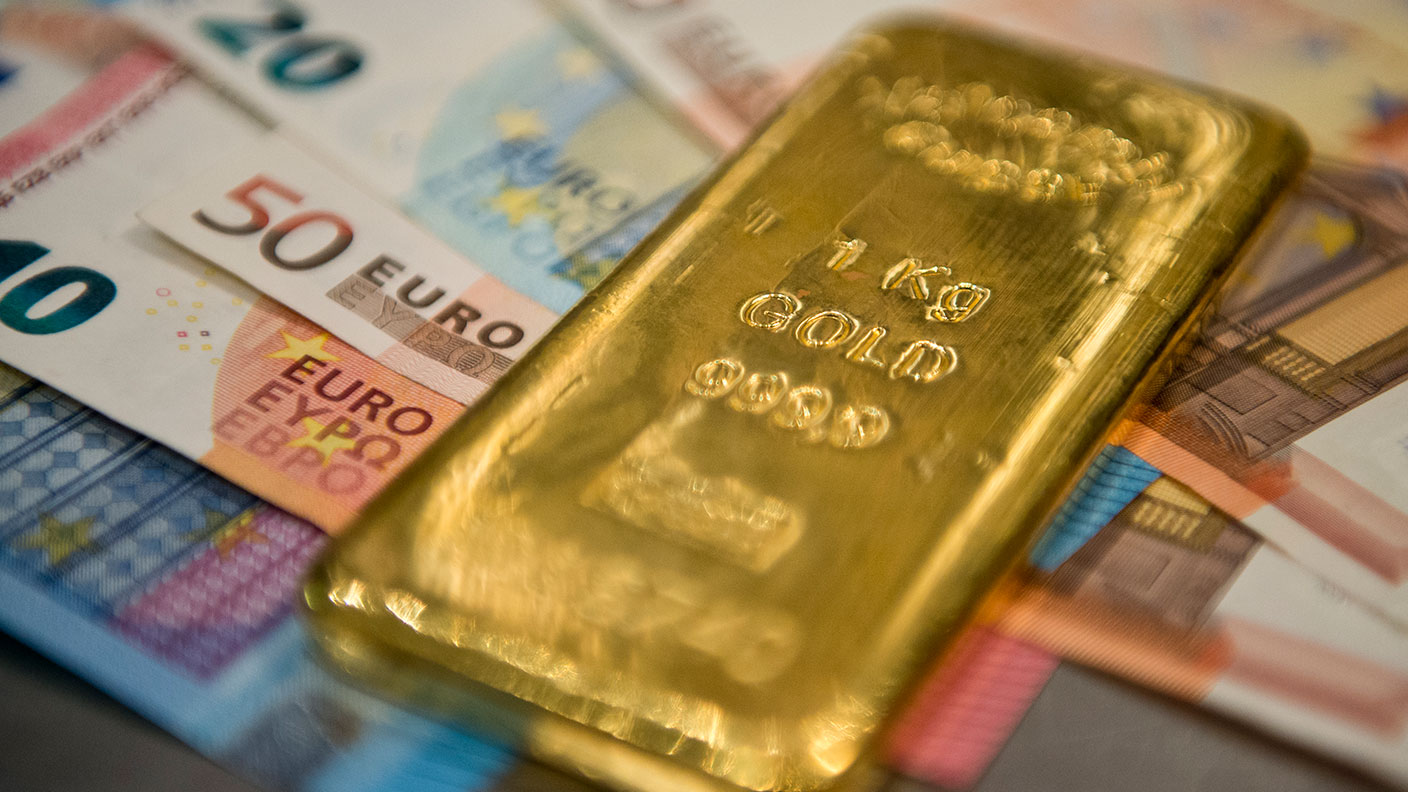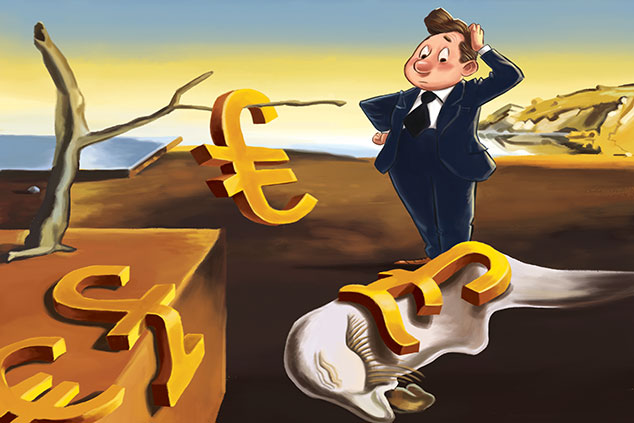How negative interest rates could spell the death of cash
In the topsy turvy world of negative interest rates, the pound in your pocket undergoes a bizarre change. John Stepek explains what that means for investors.

Get the latest financial news, insights and expert analysis from our award-winning MoneyWeek team, to help you understand what really matters when it comes to your finances.
You are now subscribed
Your newsletter sign-up was successful
Want to add more newsletters?

Twice daily
MoneyWeek
Get the latest financial news, insights and expert analysis from our award-winning MoneyWeek team, to help you understand what really matters when it comes to your finances.

Four times a week
Look After My Bills
Sign up to our free money-saving newsletter, filled with the latest news and expert advice to help you find the best tips and deals for managing your bills. Start saving today!
I was going to catch the bus to the train station this morning, to save taking the car.
I left the house. Halfway down the road I thought to check my wallet. No cash on me. The local bus doesn't take contactless (yet). By the time I'd got back to the house, the bus had left.
So I had to take the car.
MoneyWeek
Subscribe to MoneyWeek today and get your first six magazine issues absolutely FREE

Sign up to Money Morning
Don't miss the latest investment and personal finances news, market analysis, plus money-saving tips with our free twice-daily newsletter
Don't miss the latest investment and personal finances news, market analysis, plus money-saving tips with our free twice-daily newsletter
I'm not telling you this to demonstrate my early-morning scattiness, but to point out that physical cash still has its uses.
And today, I want to have a little think about what negative interest rates tell us about the relationship between digital fiat cash and paper fiat cash.
The distinction between digital fiat currency and paper fiat currency
In many parts of the world, as we've discussed a lot recently, interest rates are now negative. It's not yet the case in the UK or the US, but it's certainly the case in most of Europe, including non-eurozone countries, such as Switzerland, and it's long been the case in Japan.
There are lots of odd effects of negative interest rates. But one that I find interesting in the context of the individual saver and investor is that negative rates make the nature of the difference between digital fiat currency (cash sitting in the bank on an electronic ledger somewhere) and paper fiat currency (physical cash) very clear.
Just quickly what do I mean by "fiat"? Fiat currency in the UK, means the pound. Fiat originates from the Latin, "let it be done". Put simply, it means that the pound is money in the UK, because the government says so. Just as in the US, the dollar is money, because the US government says so. So a fiat currency is simply one that is backed by a government rather than anything else. It's what you have to pay your taxes in.
So, in "normal" times, when interest rates are positive, we put our cash in the bank in the form of digital fiat, and the bank pays us interest on that. The interest rate may not always be positive in "real" terms (ie, it may not keep up with inflation). But even then, the rate on digital fiat has typically always been positive in nominal terms, and therefore always higher than the rate of interest on fiat paper, which is, of course, 0%.
In that world, digital fiat currency ie, money in the bank pays more interest than paper fiat currency. But we don't tend to think of the two as being particularly different. Paper money and digital money remain interchangeable in our minds. They are not two different asset classes. They're both simply "cash".
Interest is just what the bank pays you in order to entice you to deposit your cash with it. You take it for granted that you'll be able to turn your digital fiat cash into paper fiat cash any time you want to. Convertibility is a given.
When interest rates turn negative, that becomes a more complicated proposition. Suddenly, the bank is no longer paying you for the privilege of the use of your money. Instead, you are paying for the privilege of having your money stored safely, in an insured institution, and for the convenience of using the digital payments system.
And suddenly with the introduction of this cost the distinction between the two becomes a lot clearer. Digital fiat is an excellent medium of exchange compared to paper fiat. But it's not as good a store of value (it depreciates in nominal terms, whereas paper fiat doesn't). Cash is also a more private means of transacting, although it's increasingly hard to use for transactions of any significant size.
The question then becomes: at what level of negative interest rate would you consider foregoing the convenience of digital fiat, and instead pay out for a safe (plus the added insurance premiums) in which to store your cash?
But this leads to other questions. The amount of paper fiat in circulation is dwarfed by the amount of digital fiat. What if everyone wants paper cash because it's more valuable and there's not enough to go around? Particularly as high-denomination notes (everything from £50 upwards) are increasingly presented by the authorities as purely the preserve of criminals.
The assumption that digital fiat can always be converted into paper fiat suddenly seems less sound, doesn't it? It sounds odd to imagine that you might not be able to turn your cash in the bank into cash in your hand, but it's not at all outlandish when you consider how inconvenient it already is to withdraw large sums.
In the past, when gold was still part of the monetary system, the US government suspended convertibility and banned ownership of the yellow metal when demand for gold threatened to undermine the banking system. Could the same thing happen to cash? I don't see why not. That's what emergency bank holidays are for, after all.
And it might never be necessary to do anything as explicit. You can increasingly use digital fiat for almost any type of payment, from church collection boxes to paying for parking. It will be much harder for paper fiat to go the way of the chequebook, but put up enough hurdles to its acceptance (how long before £20 notes are deemed the choice of the drug dealer?) and it'll get there.
What this shift in thinking means for investors
This is all just a thought experiment. But it's the sort of thought experiment that might help us to get a grip on what a world of negative interest rates really means.
The whole post-2008 world has been a story about "normal" (ie, non-finance workers) people waking up and realising that the financial system does not operate the way that they thought it did.
And because the financial world is reflexive (it both shapes our beliefs and changes in accordance with them), this shift in beliefs then affects investor behaviour and therefore asset prices.
So, what does this mean for investors?
Firstly, in a world where fiat currency is mostly digital and also prone to aggressive and overt manipulation or confiscation by governments, you can start to see why something like bitcoin (which is neither backed, nor manipulated, by a government or central authority) might grow more popular.
Secondly, you can see why an asset like gold, which used to be part of the monetary system, and which is also not dependent on a government or central authority for its value, is also more attractive in this kind of world.
We'll be discussing this topic in a lot more detail at the MoneyWeek Wealth Summit on 22 November, with guests including financial historian Russell Napier book your ticket now if you haven't already.
Get the latest financial news, insights and expert analysis from our award-winning MoneyWeek team, to help you understand what really matters when it comes to your finances.

-
 Should you buy an active ETF?
Should you buy an active ETF?ETFs are often mischaracterised as passive products, but they can be a convenient way to add active management to your portfolio
-
 Power up your pension before 5 April – easy ways to save before the tax year end
Power up your pension before 5 April – easy ways to save before the tax year endWith the end of the tax year looming, pension savers currently have a window to review and maximise what’s going into their retirement funds – we look at how
-
 What would negative interest rates mean for your money?
What would negative interest rates mean for your money?Opinion There has been much talk of the Bank of England introducing negative interest rates. John Stepek explains why they might do that, and what it would mean for your money.
-
 Is the UK heading for negative interest rates?
Is the UK heading for negative interest rates?News The hints that negative interest rates are heading for Britain are now coming thick and fast.
-
Prepare yourself for negative interest rates
Editor's letter There is a lot of talk about negative interest rates coming to the UK. They're a terrible idea, says Merryn Somerset Webb.
-
Trump urges the US Federal Reserve to bring in negative interest rates
News Donald Trump has urged the Federal Reserve to embrace negative interest rates.
-
 What are negative interest rates and could they happen here?
What are negative interest rates and could they happen here?Analysis Negative interest rates – where banks pay you to borrow money – now exist in many parts of the world. John Stepek explains why they are a terrible idea, and how likely we are to see them in the UK.
-
The dangers of negative interest rates
Features Negative interest rates could spark the next financial crisis. And central bankers could end up the object of the public's wrath, says Merryn Somerset Webb.
-
 Navigating the weird world of negative interest rates
Navigating the weird world of negative interest ratesTutorials Investors are paying good money to be allowed to lend money to governments across the world. What on earth is going on, and what does it mean for your money? John Stepek reports.
-
Could interest rates go negative?
Features The Bank of England has cut interest rates and expanded quantitative easing to boost the economy. If this fails, what might it try next? Matthew Partridge reports.